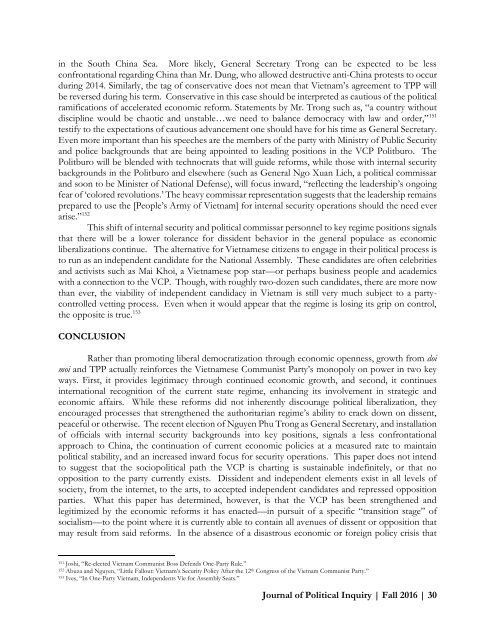Fall2016_Final2
You also want an ePaper? Increase the reach of your titles
YUMPU automatically turns print PDFs into web optimized ePapers that Google loves.
in the South China Sea. More likely, General Secretary Trong can be expected to be less<br />
confrontational regarding China than Mr. Dung, who allowed destructive anti-China protests to occur<br />
during 2014. Similarly, the tag of conservative does not mean that Vietnam’s agreement to TPP will<br />
be reversed during his term. Conservative in this case should be interpreted as cautious of the political<br />
ramifications of accelerated economic reform. Statements by Mr. Trong such as, “a country without<br />
discipline would be chaotic and unstable…we need to balance democracy with law and order,” 151<br />
testify to the expectations of cautious advancement one should have for his time as General Secretary.<br />
Even more important than his speeches are the members of the party with Ministry of Public Security<br />
and police backgrounds that are being appointed to leading positions in the VCP Politburo. The<br />
Politburo will be blended with technocrats that will guide reforms, while those with internal security<br />
backgrounds in the Politburo and elsewhere (such as General Ngo Xuan Lich, a political commissar<br />
and soon to be Minister of National Defense), will focus inward, “reflecting the leadership’s ongoing<br />
fear of ‘colored revolutions.’ The heavy commissar representation suggests that the leadership remains<br />
prepared to use the [People’s Army of Vietnam] for internal security operations should the need ever<br />
arise.” 152<br />
This shift of internal security and political commissar personnel to key regime positions signals<br />
that there will be a lower tolerance for dissident behavior in the general populace as economic<br />
liberalizations continue. The alternative for Vietnamese citizens to engage in their political process is<br />
to run as an independent candidate for the National Assembly. These candidates are often celebrities<br />
and activists such as Mai Khoi, a Vietnamese pop star—or perhaps business people and academics<br />
with a connection to the VCP. Though, with roughly two-dozen such candidates, there are more now<br />
than ever, the viability of independent candidacy in Vietnam is still very much subject to a partycontrolled<br />
vetting process. Even when it would appear that the regime is losing its grip on control,<br />
the opposite is true. 153<br />
CONCLUSION<br />
Rather than promoting liberal democratization through economic openness, growth from doi<br />
moi and TPP actually reinforces the Vietnamese Communist Party’s monopoly on power in two key<br />
ways. First, it provides legitimacy through continued economic growth, and second, it continues<br />
international recognition of the current state regime, enhancing its involvement in strategic and<br />
economic affairs. While these reforms did not inherently discourage political liberalization, they<br />
encouraged processes that strengthened the authoritarian regime’s ability to crack down on dissent,<br />
peaceful or otherwise. The recent election of Nguyen Phu Trong as General Secretary, and installation<br />
of officials with internal security backgrounds into key positions, signals a less confrontational<br />
approach to China, the continuation of current economic policies at a measured rate to maintain<br />
political stability, and an increased inward focus for security operations. This paper does not intend<br />
to suggest that the sociopolitical path the VCP is charting is sustainable indefinitely, or that no<br />
opposition to the party currently exists. Dissident and independent elements exist in all levels of<br />
society, from the internet, to the arts, to accepted independent candidates and repressed opposition<br />
parties. What this paper has determined, however, is that the VCP has been strengthened and<br />
legitimized by the economic reforms it has enacted—in pursuit of a specific “transition stage” of<br />
socialism—to the point where it is currently able to contain all avenues of dissent or opposition that<br />
may result from said reforms. In the absence of a disastrous economic or foreign policy crisis that<br />
151<br />
Joshi, “Re-elected Vietnam Communist Boss Defends One-Party Rule.”<br />
152<br />
Abuza and Nguyen, “Little Fallout: Vietnam’s Security Policy After the 12 th Congress of the Vietnam Communist Party.”<br />
153<br />
Ives, “In One-Party Vietnam, Independents Vie for Assembly Seats.”<br />
Journal of Political Inquiry | Fall 2016 | 30
















